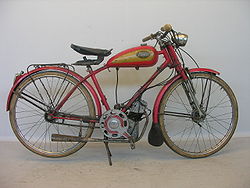History
Early days
In 1926 Antonio Cavalieri Ducati and his three sons, Adriano, Marcello, and Bruno Cavalieri Ducati, founded Società Scientifica Radiobrevetti Ducati (SSR Ducati) in Bologna to produce vacuum tubes, condensers and other radio components.
In 1935 they had become successful enough to enable construction of a new factory in the Borgo Panigale area of the city. Production was maintained during World War II, despite the Ducati factory being a repeated target of Allied bombing.
It was finally destroyed by around 40 Consolidated B-24 Liberators on 12 October 1944 as part of the United States Army Air Forces's Operation Pancake, which involved some 700 aircraft flying from airfields in the Province of Foggia. [1]
Nonetheless, it maintained production.


Venturing into motorcycles
The company started manufacturing motorcycle-related items when in 1950, manufacturing the "Cucciolo", an engine for mounting on bicycles, for a small Turinese firm, SIATA (Societa Italiana per Applicazioni Tecniche Auto-Aviatorie), later selling a product of their own based on the Cucciolo.
This first Ducati motorcycle was a 48 cc bike weighing 98 lb (44 kg), with a top speed of 40 mph (64 km/h), and had a 15 mm carburetor (0.59 in) giving just under 200 mpg‑US (1.2 L/100 km; 240 mpg‑imp). Ducati soon dropped the Cucciolo name in favor of "55M" and "65TL".
In the following years, the company expanded their offer when the market moved on to larger motorcycles.
When the market moved toward larger motorcycles, Ducati management decided to respond, making an impression at an early-1952 Milan show, introducing their 65TS cycle and Cruiser (a four-stroke motor scooter).
Despite being described as the most interesting new machine at the 1952 show, the Cruiser was not a great success, and only a few thousand were made over a two-year period before the model ceased production.
By 1954, Ducati Meccanica SpA had increased production to 120 bikes a day.
In the 1960s, Ducati earned its place in motorcycling history by producing the fastest 250cc road bike then available, the Mach 1. [2] [3] [4]
Management split
In 1953, management split the company into two separate entities, Ducati Meccanica SpA and Ducati Elettronica, in acknowledgment of its diverging motorcycle and electronics product lines. Ducati Elettronica became Ducati Energia SpA in the eighties.
Dr. Giuseppe Montano took over as head of Ducati Meccanica SpA and the Borgo Panigale factory was modernized with government assistance.
Changed ownership
In 1985, Cagiva bought Ducati and planned to rebadge Ducati motorcycles with the "Cagiva" name.
By the time the purchase was completed, Cagiva kept the "Ducati" name on its motorcycles.
Eleven years later, in 1996, Cagiva accepted the offer from Texas Pacific Group and sold a 51% stake in the company for US$325 million; then, in 1998, Texas Pacific Group bought most of the remaining 49% to become the sole owner of Ducati.
In 1999, TPG issued an initial public offering of Ducati stock and renamed the company "Ducati Motor Holding SpA".
TPG sold over 65% of its shares in Ducati, leaving TPG the majority shareholder.
In December 2005, Ducati returned to Italian ownership with the sale of Texas Pacific's stake (minus one share) to Investindustrial Holdings, the investment fund of Carlo and Andrea Bonomi.
In April 2012, Volkswagen Group's Audi subsidiary announced its intention to buy Ducati for €860 million (US$1.2 billion).
Volkswagen chairman Ferdinand Piëch, a motorcycle enthusiast, had long coveted Ducati, and had regretted that he passed up an opportunity to buy the company from the Italian government in 1984.
Analysts doubted a tiny motorcycle maker would have a meaningful effect on a company the size of Volkswagen, commenting that the acquisition has "a trophy feel to it," and, "is driven by VW's passion for nameplates rather than industrial or financial logic". Italian luxury car brand Lamborghini was strengthened under VW ownership. [5] [6]
Audi AG's Automobili Lamborghini S.p.A. subsidiary acquired 100 percent of the shares of Ducati Motor Holding S.p.A. on 19 July 2012 for €747 million (US$909 million). [7]